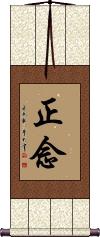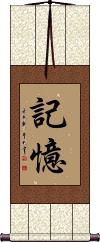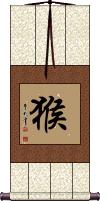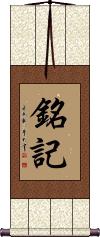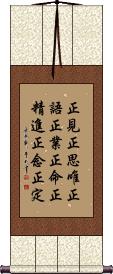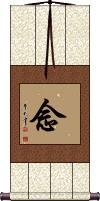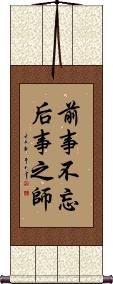Many custom options...
And formats...

In Memory Of in Chinese / Japanese...
Buy an In Memory Of calligraphy wall scroll here!
Personalize your custom “In Memory Of” project by clicking the button next to your favorite “In Memory Of” title below...
1. 7. Right Mindfulness / Right Memory / Perfect Mindfulness
2. Remember
3. Monkey
4. Remember
5. All Tenets of the Noble Eightfold Path
6. Mindfulness
7. Right Mindfulness / Right Memory / Perfect Mindfulness
Samyak Smriti / Samyak Smrti / Samma Sati
正念 is one of the Noble Eightfold Paths of Buddhism. Right Mindfulness, along with Right Effort and Right Concentration, constitute the path to Concentration or Perfect Thought.
Right Mindfulness is about remaining focused on one's body, feelings, mind, and mental qualities. It's also about being ardent, aware, and mindful, and supposes that you've already put aside worldly desire and aversion.
Monk Bhikkhu Bodhi described this as “The mind is deliberately kept at the level of bare attention, a detached observation of what is happening within us and around us in the present moment.” When practicing right mindfulness, the mind is trained to remain in the present, open, quiet, and alert, contemplating the present event.
Another definition: Ongoing mindfulness of body, feelings, thinking, and objects of thought.
This term is exclusively used by devout Buddhists. It is not a common term, and is remains an unknown concept to most Japanese and Chinese people.
See Also: Buddhism | Enlightenment | Noble Eightfold Path
Remember
記憶 is a Japanese Kanji, old Korean Hanja, and Chinese word that means “to remember.”
This can also be translated as memory, to recall, recollection, or remembrance.
Monkey
Year of the Monkey / Zodiac Sign
猴 is the monkey character in Chinese.
猴 means ape in Japanese due to an error made long ago as Japan absorbed Chinese characters.
If you were born in the year of the monkey, you . . .
Are smart, brave, active, and competitive.
Like new things.
Have a good memory.
Are quick to respond
Have an easy time winning people's trust.
Are, however, not very patient.
See also our Chinese Zodiac page.
Note: This character does have the meaning of monkey in Korean Hanja but is not used very often.
Remember
銘記 means to keep in mind, to take note of, or simply to remember, in Chinese characters and Japanese Kanji.
The first character means to engrave, inscribe, or carve an inscription.
The second character means to remember, note, mark, sign, record, history, chronicle, or annals.
When used in the context of a person, this means to engrave on the heart or to inscribe a memory in one's mind. In short, it's the idea of deeply remembering something, some event, or someone forever.
All Tenets of the Noble Eightfold Path
These are the eight tenets of the Buddhist Noble Eightfold Path written altogether.
Here's this list of tenets in English:
1. Right View / Right Understanding / Right Perspective / Perfect View
2. Right Resolve / Right Thought / Right Intention / Perfect Resolve
3. Right Speech / Right Talk / Perfect Speech
4. Right Action / Perfect Conduct
5. Right Living / Right Livelihood / Perfect Livelihood
6. Right Effort / Right Endeavor / Perfect Effort
7. Right Mindfulness / Right Memory / Perfect Mindfulness
8. Right Concentration / Perfect Concentration
Mindfulness
念 is the simplest way to write “mindfulness” in Chinese, Japanese Kanji, and old Korean Hanja.
念 can be defined these ways: To read; to study (a degree course); to read aloud; to miss somebody (keeping them in your mind); idea; remembrance; sense; thought; feeling; desire; concern; attention; recollection; memory; to think on/about; reflect; repeat, intone; a moment.
Obviously, the context in which the character is used determines which definition or meaning is perceived. As a single character, it's open and perhaps ambiguous. Thus, it can be read with any or all of these meanings.
念 is used in a Buddhist context (often written as 正念 or “right mindfulness”) with similar meanings of thought and contemplation.
In Japanese, this character is sometimes used as the name “Nen.”
See Also: Buddhism | Enlightenment
Past experience is the teacher for the future
Past events not forgotten serve as teachers for later events.
The most literal translation to English of this ancient 前事不忘后事之师 Chinese proverb is:
“Past events not forgotten serve as teachers for later events.”
However, it's been translated several ways:
Don't forget past events, they can guide you in the future.
Benefit from past experience.
Past experience, if not forgotten, is a guide for the future.
Past calamity is my teacher.
A good memory for the past is a teacher for the future.
The remembrance of the past is the teacher of the future.
If one remembers the lessons of the past; They will serve as a guide to avoid mistakes in the future.
The origin:
This proverb comes from the 5th century B.C., just before the Warring States Period in the territory now known as China.
The head of the State of Jin, Zhi Bo, seized power in a coup. He did this with help from the armies of the State of Han and Wei. Instead of being grateful for the help from Han and Wei, he treacherously took the land of Han and Wei. Never satisfied, Zhi Bo employed the armies of Han and Wei to attack and seize the State of Zhao.
The king of Zhao took advice from his minister Zhang Mengtan and secretly contacted the Han and Wei armies to reverse their plans and attack the army of Zhi Bo instead. The plan was successful, and the State of Zhao was not only saved but was set to become a powerful kingdom in the region.
Zhang Mengtan immediately submitted his resignation to a confused king of Zhao. When asked why, Zhang Mengtan said, “I've done my duty to save my kingdom, but looking back at past experience, I know sovereign kings are never satisfied with the power or land at hand. They will join others and fight for more power and more land. I must learn from past experiences, as those experiences are the teachers of future events.”
The king could not dispute the logic in that statement and accepted Zhang Mengtan's resignation.
For generations, the State of Zhao continued to fight for power and land until finally defeated and decimated by the State of Qin (which led to the birth of the Qin Dynasty in 221 B.C.).
Not the results for in memory of that you were looking for?
Below are some entries from our dictionary that may match your in memory of search...
| Characters If shown, 2nd row is Simp. Chinese |
Pronunciation Romanization |
Simple Dictionary Definition |
力 see styles |
lì li4 li riki りき |
More info & calligraphy: Power / Strength(suffix) strength; power; proficiency; ability; (given name) Riki bala; power, strength, of which there are several categories: 二力 power of choice and of practice; 三力 the power of Buddha; of meditation (samādhi) and of practice. 五力 pañcabala, the five powers of faith, zeal, memory (or remembering), meditation, and wisdom. 六力 A child's power is in crying; a woman's in resentment; a king's in domineering; an arhat's in zeal (or progress); a Buddha's in mercy; and a bhikṣu's in endurance (of despite) . 十力 q.v. The ten powers of Buddhas and bodhisattvas. |
宙 see styles |
zhòu zhou4 chou hiroshi ひろし |
More info & calligraphy: Universe / Space(1) space; air; midair; (2) (See 空・そら・5) (from) memory; (by) heart; (male given name) Hiroshi |
念 see styles |
niàn nian4 nien nen ねん |
More info & calligraphy: Mindfulness(1) (esp. 〜の念) sense; idea; thought; feeling; (2) desire; concern; (3) (esp. 念に〜、念の/が〜) attention; care; (personal name) Nen smṛti. Recollection, memory; to think on, reflect; repeat, intone; a thought; a moment. |
默 see styles |
mò mo4 mo moku |
More info & calligraphy: SilenceDark, secret, silent, profound. |
記憶 记忆 see styles |
jì yì ji4 yi4 chi i kioku きおく |
More info & calligraphy: Remember(noun, transitive verb) (1) memory; recollection; remembrance; (noun, transitive verb) (2) {comp} memory; storage memory |
銘記 铭记 see styles |
míng jì ming2 ji4 ming chi meiki / meki めいき |
More info & calligraphy: Remember(noun, transitive verb) keep in mind; take note of; remember |
八正道 see styles |
bā zhèng dào ba1 zheng4 dao4 pa cheng tao hasshōdō はっしょうどう |
More info & calligraphy: The Noble Eightfold Path(Buddhist term) noble eightfold path (八正道分) Āryamārga. The eight right or correct ways, the "eightfold noble path" for the arhat to nirvāṇa; also styled 八道船, 八正門, 八由行, 八游行, 八聖道支, 八道行, 八直行, 八直道. The eight are: (1) 正見Samyag-dṛṣṭi, correct views in regard to the Four Axioms, and freedom from the common delusion. (2) 正思 Samyak-saṁkalpa, correct thought and purpose. (3) 正語 Samyag-vāc, correct speech, avoidance of false and idle talk. (4) 正業 Samyak-karmānta, correct deed, or conduct, getting rid of all improper action so as to dwell in purity. (5) 正命 Smnyag-ājīva, correct livelihood or occupation, avoiding the five immoral occupations. (6) 正精進 Samyag-vyāyāma, correct zeal, or energy in uninterrupted progress in the way of nirvāṇa. (7) 正念 Samyak-smṛti, correct remembrance, or memory, which retains the true and excludes the false. (8) 正定 Samyak-samadhi, correct meditation, absorption, or abstraction. The 正 means of course Buddhist orthodoxy, anything contrary to this being 邪 or heterodox, and wrong. |
憶 忆 see styles |
yì yi4 i omoi おもい |
to recollect; to remember; memory (female given name) Omoi To recall, reflect on. |
背 see styles |
bèi bei4 pei sobira そびら |
the back of a body or object; to turn one's back; to hide something from; to learn by heart; to recite from memory; (slang) unlucky; hard of hearing (dated) (See 背中) back (of the body) Back, behind; turn the back on, go contrary on the back. |
五力 see styles |
wǔ lì wu3 li4 wu li goriki |
pañcabalāni, the five powers or faculties — one of the categories of the thirty-seven bodhipakṣika dharma 三十七助道品; they destroy the 五障 five obstacles, each by each, and are: 信力 śraddhābala, faith (destroying doubt); 精進力 vīryabala, zeal (destroying remissness); 念 or 勤念 smṛtibala, memory or thought (destroying falsity); 正定力 samādhibala, concentration of mind, or meditation (destroying confused or wandering thoughts); and 慧力 prajñābala, wisdom (destroying all illusion and delusion). Also the five transcendent powers, i. e. 定力 the power of meditation; 通力 the resulting supernatural powers; 借識力 adaptability, or powers of 'borrowing' or evolving any required organ of sense, or knowledge, i. e. by beings above the second dhyāna heavens; 大願力 the power of accomplishing a vow by a Buddha or bodhisattva; and 法威德力 the august power of Dharma. Also, the five kinds of Mara powers exerted on sight, 五大明王. |
五根 see styles |
wǔ gēn wu3 gen1 wu ken gokon |
pañcendriyāṇi. (1) The five roots, i. e. the five organs of the senses: eyes, ears, nose, tongue, and body as roots of knowing. (2) The five spiritual organs pr positive agents: 信 faith, 精進 energy, 念 memory, 定 visionary meditation, 慧 wisdom. The 五力 q. v. are regarded as negative agents. |
余韻 see styles |
yoin よいん |
(1) reverberation; swelling (of a hymn); trailing note; (2) lingering memory; aftertaste; (3) suggestiveness (of a book, poem, etc.) |
內存 内存 see styles |
nèi cún nei4 cun2 nei ts`un nei tsun |
internal storage; computer memory; random access memory (RAM) |
六麤 六粗 see styles |
liù cū liu4 cu1 liu ts`u liu tsu rokuso |
The six 'coarser' stages arising from the 三細 or three finer stages which in turn are produced by original 無明, the unenlightened condition of ignorance; v. Awakening of Faith 起信論. They are the states of (1) 智相 knowledge or consciousness of like and dislike arising from mental conditions; (2) 相續相 consciousness of pain and pleasure resulting from the first, causing continuous responsive memory; (3) 執取相 attachment or clinging, arising from the last; (4) 計名字相 assigning names according to the seeming and unreal with fixation of ideas); (5) 起業 the consequent activity with all the variety of deeds; (6) 業繋苦相 the suffering resulting from being tied to deeds and their karma consequences. |
再生 see styles |
zài shēng zai4 sheng1 tsai sheng saisei / saise さいせい |
to be reborn; to regenerate; to be a second so-and-so (famous dead person); recycling; regeneration (n,vs,vt,vi) (1) restoration to life; coming to life again; resuscitation; regeneration; (n,vs,vi) (2) reformation; rehabilitation; (noun, transitive verb) (3) recycling; reclamation; recovery; (noun, transitive verb) (4) playback; regeneration (of video or sound); views (of an online video); (n,vs,vt,vi) (5) {biol} regeneration (of lost or damaged tissue); regrowth; (noun, transitive verb) (6) rebirth; reincarnation; (n,vs,vt,vi) (7) {psych} recall (memory); retrieval |
分頁 分页 see styles |
fēn yè fen1 ye4 fen yeh |
(computing) to insert a page break; to paginate; pagination; memory paging; tab (GUI element) |
印象 see styles |
yìn xiàng yin4 xiang4 yin hsiang inshou / insho いんしょう |
impression (something that stays in one's mind); a memory impression; (given name) Inshou |
名表 see styles |
naomote なおもて |
(See 名残) remains; traces; vestiges; memory |
哀慕 see styles |
aibo あいぼ |
cherish the memory of; yearn for |
善忘 see styles |
shàn wàng shan4 wang4 shan wang |
to be forgetful; to have a short memory |
失念 see styles |
shī niàn shi1 nian4 shih nien shitsunen しつねん |
(noun, transitive verb) forgetting; lapse of memory To lose the train of thought, or meditation; a wandering mind; loss of memory. |
失憶 失忆 see styles |
shī yì shi1 yi4 shih i |
to lose one's memory |
奉持 see styles |
fèng chí feng4 chi2 feng ch`ih feng chih buji ほうじ |
(noun/participle) bearing; presenting; holding up (emperor's picture) to bear in mind (or memory) with all respect |
存儲 存储 see styles |
cún chǔ cun2 chu3 ts`un ch`u tsun chu |
to store up; to stockpile; (computer) to save; to store; memory; storage |
守節 守节 see styles |
shǒu jié shou3 jie2 shou chieh |
faithful (to the memory of betrothed); constant (of widow who remains unmarried) |
尋址 寻址 see styles |
xún zhǐ xun2 zhi3 hsün chih |
to address; to search for address; to input data into memory |
對課 对课 see styles |
duì kè dui4 ke4 tui k`o tui ko |
to give answering phrase (school exercise in memory or composition) |
度忘 see styles |
dowasure どわすれ |
(irregular okurigana usage) (noun/participle) lapse of memory; forgetting for a moment something one knows well; (something) slipping one's mind |
強記 see styles |
tsuyoki つよき |
(noun, transitive verb) (form) good memory; retentive memory; (personal name) Tsuyoki |
復現 复现 see styles |
fù xiàn fu4 xian4 fu hsien fukugen |
to reappear; to persist (in memory) reappear |
Click here for more in memory of results from our dictionary
The following table may be helpful for those studying Chinese or Japanese...
| Title | Characters | Romaji (Romanized Japanese) | Various forms of Romanized Chinese | |
| 7. Right Mindfulness Right Memory Perfect Mindfulness | 正念 | sei nen / seinen | zhèng niàn zheng4 nian4 zheng nian zhengnian | cheng nien chengnien |
| Remember | 記憶 | kioku | jì yì / ji4 yi4 / ji yi / jiyi | chi i / chii |
| Monkey | 猴 | hóu / hou2 / hou | ||
| Remember | 銘記 | mei ki / meiki | míng jì / ming2 ji4 / ming ji / mingji | ming chi / mingchi |
| All Tenets of the Noble Eightfold Path | 正見正思唯正語正業正命正精進正念正定 正见正思唯正语正业正命正精进正念正定 | shouken shoushiyui shougo shougo shoumyou shoushoujin shounen shoujou shoken shoshiyui shogo shogo shomyo shoshojin shonen shojo | zhèng jiàn zhèng sī wéi zhèng yǔ zhèng yè zhèng mìng zhèng jīng jìn zhèng niàn zhèng dìng zheng4 jian4 zheng4 si1 wei2 zheng4 yu3 zheng4 ye4 zheng4 ming4 zheng4 jing1 jin4 zheng4 nian4 zheng4 ding4 zheng jian zheng si wei zheng yu zheng ye zheng ming zheng jing jin zheng nian zheng ding | cheng chien cheng ssu wei cheng yü cheng yeh cheng ming cheng ching chin cheng nien cheng ting |
| Mindfulness | 念 | nen | niàn / nian4 / nian | nien |
| Past experience is the teacher for the future | 前事不忘后事之師 前事不忘后事之师 | qián shì bú wàng hòu shí zhī shī qian2 shi4 bu2 wang4 hou4 shi2 zhi1 shi1 qian shi bu wang hou shi zhi shi | ch`ien shih pu wang hou shih chih shih chien shih pu wang hou shih chih shih |
|
| In some entries above you will see that characters have different versions above and below a line. In these cases, the characters above the line are Traditional Chinese, while the ones below are Simplified Chinese. | ||||
Successful Chinese Character and Japanese Kanji calligraphy searches within the last few hours...
